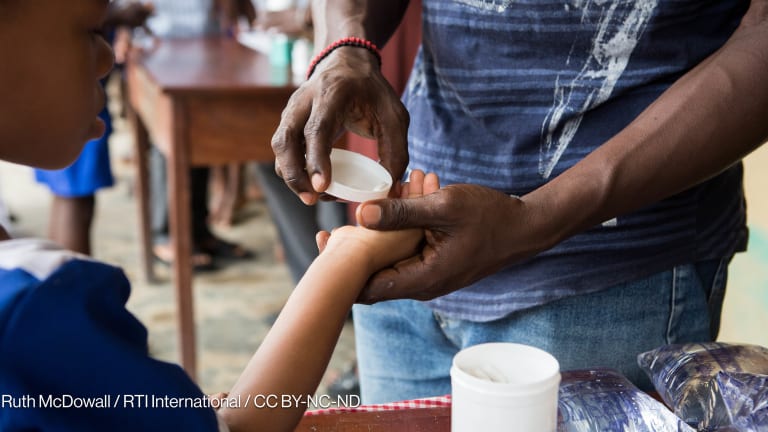Top global health schools: A primer
Universities from Asia to the Americas are preparing students for careers in the booming global health field. We examine some of the top choices.
The field of global health is diverse - and so is the breadth of schools that offer programs to prepare tomorrow’s leaders in this booming industry. Those who wish to specialize in this field should consider a variety of factors before deciding which institutions to enroll in. Most importantly, students should be clear about their career goals and know which schools excel in their area of interest. Several factors can be used to gauge a school’s quality of service, including a school’s staffing, academic awards, research funding, class size, global partnerships, exchange programs and, of course, cost. Many renowned programs receive a large number of applications and offer less financial aid, whereas smaller programs provide substantial assistance while still delivering quality education. The following list includes some of the largest, wealthiest, most prestigious universities in global health: University of Pennsylvania School of Medicine - Location: Philadelphia, USA - Faculty: 1,700 - Student body: 2,200 - Tuition: $42,472 (estimated tuition for first-year doctoral students in 2009-‘10) The university is home to the oldest medical school in the United States, and in 2007 ranked second in the nation. The same year, it received $405 million from the National Institutes of Health. The medical school’s 28 departments encompass all areas of biomedical research. The university’s nursing school offers 18 distinct master’s programs. Karolinska Institutet - Location: Stockholm, Sweden - Faculty: 4,000 (full-time) - Student body: 4,300 undergraduate and 2,300 postgraduate students - Tuition: higher education is free in Sweden, although international students may be charged in the future This medical university - one of Europe’s largest - awards the Nobel Prize in medicine. In 2008, the institute offered 16 undergraduate degrees and master’s programs in biomedicine, public health sciences and clinical medicine. University of Oxford - Location: Oxford, U.K. - Faculty: 257 (public health division) - Student body: more than 30,000 - Tuition: £25,500 (estimated tuition for first-year doctoral students in 2009-‘10) The U.K.’s most esteemed university boasts acclaimed departments of public health and medicine. The department of clinical/tropical medicine has permanent bases in 12 locations throughout Asia and Africa. In addition to a master’s of science in global health, Oxford offers a unique global health summer school program. Yale University - Location: New Haven, USA - Faculty: 3016 (medical school) - Student body: 1,040 medical students - Tuition: $31,900 (estimated tuition for first-year master’s students in 2009-‘10) This Ivy League university accepts around 125 master’s of health practices students per year. As part of the university’s renowned school of medicine, the Center for Interdisciplinary Research on AIDS conducts research in Russia, India, China and South Africa. Yale’s unique Institute for Biospheric Studies Center for Eco-Epidemiology merges the boundaries between the medical and environmental sciences. Universidad de Barcelona - Location: Barcelona, Spain - Faculty: more than 4,500 - Student body: 60,000 - Tuition: 1,500-1,800 euros (average master’s program of 60 credits) It is viewed as one of Spain’s top universities, especially for nursing and medicine. The school boasts 30 research centers, 353 graduate programs and 96 doctoral programs. Harvard University - Location: Cambridge, USA - Faculty: 395 (public health) - Student body: 897 new public health students in 2008 - Tuition: $36,125 (estimated tuition for first-year master’s students in 2009-‘10) Recently ranked by U.S. News and World Report as the second-best public health school in the United States, staff includes two Nobel Prize winners and over 90 percent of students already have a doctoral degree. The school offers a variety of degrees, including master’s in public health with concentrations in global health or epidemiology, and a doctoral degree in health systems. Johns Hopkins University - Location: Washington, USA - Faculty: 1,000 - Student body: 2,030 from 84 nations - Tuition: $18,500 (estimated tuition for first-year master’s students in 2009-‘10) The Bloomberg School of Public Health is the largest of its kind worldwide, and it is frequently rated number one by U.S. News & World Report. With ongoing research in more than 90 countries, departments include environmental health sciences, international health, immunology, microbiology and health policy management. Columbia University - Location: New York, USA - Faculty: more than 500 - Student body: more than 1,000 from 58 countries - Tuition: $29,952 (estimated tuition for first-year master’s students in 2009-‘10) The Mailman School of Public Health is the third-largest recipient of sponsored research among all U.S. schools of public health. Mailman offers 31 master’s degree tracks and eight doctoral tracks with programs in 80 countries around the globe. University of Toronto - Location: Toronto, Canada - Faculty: more than 2,380 - Student body: more than 60,000 - Tuition: CAN $20,000 (estimated tuition for first-year master’s students in 2009-‘10) This university is an international leader in clinical epidemiology. It hosts more than 80 leading researchers and boasts the largest health services research program in English Canada. The university’s Bloomberg Faculty of Nursing offers exchange projects with Australia, Brazil, Finland, Mexico, Ethiopia and India. Kyoto University - Location: Kyoto, Japan - Faculty: 2,900 - Student body: 22,000 students - Tuition: US$5,927 (per year, for graduate students in 2008) With 13 research institutes and five Nobel laureates among its alumni, Kyoto University is considered by many as Japan’s top institute of higher learning. The school of public health includes a department of global health and socio-epidemiology, which hosts a center for UNAIDS. London School of Hygiene & Tropical Medicine - Location: London, U.K. - Faculty: 1,200 - Student body: more than 800 from 120 countries - Tuition: £15,150 (per year, for master’s students in 2009) The London School of Hygiene & Tropical Medicine is Britain’s national school of public health and the largest institution of its kind in Europe. Its collaborations span more than 100 countries throughout the world. Research funding now exceeds £48 million per year. Emory University - Location: Atlanta, USA - Faculty: more than 2,700 - Students: 5,330 graduate students overall and 455 medical students - Tuition: $24,000 (estimated tuition for first-year master’s students in 2009-‘10) A top biomedical research institution, the Emory Vaccine Center represents one of the largest academic vaccine centers in the world. Nearly 7,000 physicians and other health care professionals participate in one of the nation’s largest continuing medical education programs. Chulalongkorn - Location: Bangkok, Thailand - Faculty: 400 (medicine) - Student body: 2,300 medical students - Tuition: $2,399 (per year, for non-Thai graduate students) The university’s school of public health is a leading hub for research aimed at improving the health of people in Southeast Asia. The school is collaborating on the AIDS Data Hub for Asia with UNAIDS, UNICEF and the World Health Organization to compile reliable epidemiological data concerning AIDS in Asia. All India Institute of Medical Science - Location: New Delhi, India - Faculty: 550 - Student body: 217-220 new master’s and medical degree students per year - Tuition: 250 rupees (per year, for master’s/medical degree) Among 150 government operated medical schools, this one is considered the leading academic medical center in India. The school operates a 2,000-bed hospital and outpatient service, which provides students exposure to a wide variety of illnesses. The institute conducts research in 42 disciplines and is home to a renowned college of nursing. University of the Western Cape - Location: Cape Town, South Africa - Student body: 15,300 - Tuition: US$4460 (per year, for international undergraduate students) The university was recently awarded a large grant by the World Health Organization to provide postgraduate training in health workforce management. It is also a partner in the Center for the Aids Program of Research, a multinational research effort supported by the U.N. UWC is home to the largest dental school in Africa. University of Washington - Location: Tocoma, USA - Faculty: more than 1,000 (health science, worldwide) - Student body: 800 new public health students in 2008 - Tuition: $11,727 (estimated tuition for first-year master’s students in 2009-‘10) The university brings together one of the strongest health sciences schools in the United States, with all six schools (medicine, public health, nursing, pharmacy, dentistry, social work) ranked among the top 10 nationally, according to U.S. News and World Report. University of North Carolina - Location: Chapel Hill, USA - Faculty: 211 (full-time) - Student body: more than 1,700 - Tuition: $22,200 (estimated tuition for first-year master’s students in 2008-‘09) Gillings School of Global Public Health is frequently ranked at the top of U.S. public health schools. It operates in more than 50 countries worldwide, and also has one of the largest U.S. programs of its kind, with a 2008 budget of $107 million. Universidad Nacional de Buenos Aires - Location: Buenos Aires, Argentina - Faculty: nearly 30,000 - Student body: more than 300,000 - Tuition: free This school, Latin America’s largest by enrollment, has been ranked Argentina’s best by the Institute of Higher Education. The university has open enrollment; Che Guevara studied here. Read more global health career advice: - Global Health Jobs: What You Need to Know - USAID Offers Twin Options for Global Health Exposure - Medical Group Offers Field Experience to the Resolute - US Fellowships in Global Health: What You Need to Know - Health Foundation Hires Foreigners in Geneva - Getting Hired at International Medical Corps Read more career advice articles.
The field of global health is diverse - and so is the breadth of schools that offer programs to prepare tomorrow’s leaders in this booming industry.
Those who wish to specialize in this field should consider a variety of factors before deciding which institutions to enroll in. Most importantly, students should be clear about their career goals and know which schools excel in their area of interest.
Several factors can be used to gauge a school’s quality of service, including a school’s staffing, academic awards, research funding, class size, global partnerships, exchange programs and, of course, cost. Many renowned programs receive a large number of applications and offer less financial aid, whereas smaller programs provide substantial assistance while still delivering quality education.
This article is exclusively for Career Account members.
Unlock this article now with a 15-day free trial of a Devex Career Account. With a Career Account subscription you will get:
- Full access to our jobs board, including over 1,000 exclusive jobs
- Your Devex profile highlighted in recruiter search results
- Connections to recruiters and industry experts through online and live Devex events
Start my 15-day free trialAlready a user?
Printing articles to share with others is a breach of our terms and conditions and copyright policy. Please use the sharing options on the left side of the article. Devex Pro members may share up to 10 articles per month using the Pro share tool ( ).
Jody is a Devex international correspondent in Washington, D.C. Previously, he worked as a monitor in South Africa's provincial parliament, as well as a researcher for the Center for Economic and Policy Research and for Glass Lewis & Co. He has studied at Rutgers University, the University of Natal and the University of the West Indies, earning a bachelor's in political science and a master's in international relations.








